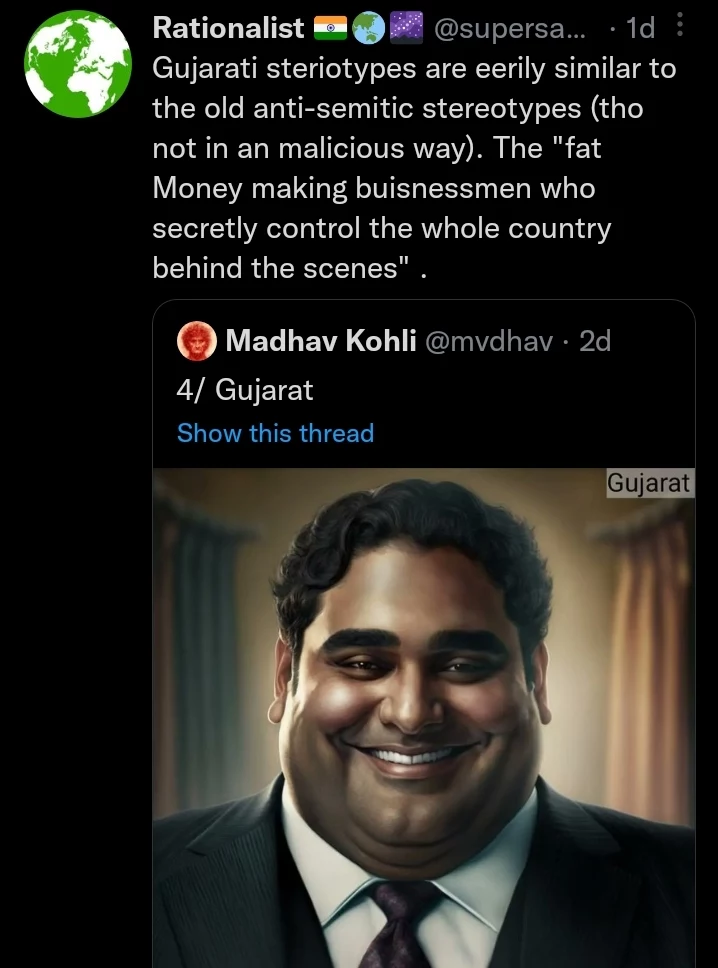- 4
- 12
FIXED LINK HERE: https://fortune.com/2023/01/07/wells-fargo-fires-executive-who-urinated-on-passenger-air-india-flight/
He butt got fired, but not before begging the foid for forgiveness
- 8
- 11
The Indian Supreme Court is expected to hear arguments in favour of same-s*x marriage this week.
As part of a set of petitions issued by two same-s*x couples, the New Delhi court will hear arguments for the recognition of same-s*x marriage on Friday (6 January).
The lead petition, filed by gay couple Supriyo Chakraborty and Abhay Dange, has argued that denying LGBTQ+ citizens the right to marry is an affront to their right to equality.
Currently, India does not officially recognise same-s*x marriage, but allows couples to engage in an “unregistered cohabitation.”
This effectively means that same-s*x couples aren't legally permitted to inherit assets or adopt. It can also complicate hospital visits if one-half of the couple is under strict visitation rules when hospitalised.
The petitioners have argued that, since inter-faith heterosexual couples are protected via Supreme Court rulings, then LGBTQ+ couples would naturally follow.
The second petition, filed by Parth Phiroze Mehrotra and Uday Raj, argues that barring LGBTQ+ couples from marriage equality violates several articles of the constitution.
"If the petitioners, as a same-s*x couple, enjoyed access to the civil institution of marriage, they would not face untold practical difficulties, both vis-a-vis each other and their children," the petition read.
"The denial of the fundamental right of marriage to persons like the petitioners is a complete violation of constitutional law."
As part of the 6 January hearing, the Indian government is expected to voice its opinion on both petitions, as well as its current position on same-s*x marriage.
Indian government unlikely to support same-s*x marriage
Prime minister Modi's government previously declared that same-s*x couples in India "cannot claim a fundamental right for same-s*x marriage" during a similar hearing in 2021.
It clarified its stance to the Delhi High Court, where it said that LGBTQ+ couples do not deserve the same rights as "traditional" heterosexual couples.
"Living together as partners and having a sexual relationship by same-s*x individuals is not comparable with the Indian family unit concept of a husband, wife and children," the government told the High Court.
While the government's position is unlikely to change, a shift in public perception toward LGBTQ+ couples could see a victory for petitioners in a similar fashion to the decriminalisation of same-s*x relationships in 2018.
- 4
- 15
The stretch these whitoid strags do man

Leather is now a critical military component

- DaddyReagan : unexile me you cowards
- lmao : Unexile me too pls
-
Sasanka_of_Gauda
: Mayocels be seething

- deleted___account : I already told you, you have to perform a public penance to be unexiled.
- 11
- 9



- DaddyReagan : unexile me you BIPOCs
- deleted___account : You have to perform a प्रायश्चित्त first and admit the superiority of the Indian race.
- 7
- 13
Indian men created using Stereotypes and ai
— Madhav Kohli (@mvdhav) December 27, 2022
First, Delhi pic.twitter.com/BVoa4GRSBt
There are too many to screenshot but here are the first few -
- 2
- 9
Raut, a close aide of Maharashtra Chief Minister Uddhav Thackeray, however, made it clear that he was not criticising Modi.
“Hitler used to do a lot of events…that’s what Modi does…..it's true….in fact Modi follows Hitler…look at the social media,” Raut said referring to the propaganda machinery.
“The way Hitler used to do events, Modi and his party do it similarly ….I am not criticising him,” he said pointing out how in 1936 Germany hosted the Summer Olympics in Berlin when the entire world was against the German dictator.
"Hitler was a popular leader, he may have been defeated later….Balasaheb Thackeray admired him…even Modi is in love with him…now if anyone praises Hitler, it cannot be treated as sedition,” he said referring to Mein Kampf.

These are the anti chuds who'll save the idea of India.

- 3
- 15
So I was reading an article about ricebag converts taken to Scandinavia and the author mentioned a guy named Sennapa Naik as a throwaway who seemed interesting. I spent 1 full hour MTLing the chapter on him from a Danish book and its genuinely a lot more entertaining than that shit article. Can't believe that journocel will get paid for it while I do it for free  Anyway
Anyway
Sennapa Naik left Tranquebar on 4 February 1795 as a stowaway aboard the Asiatic Company's "Juliane Marie"<, The following day it was written in the ship's log: "Found that a black sailor named Senepa had got into the ship and stuck himself between the pumps on the lee. When he appeared before the captain, he declared that he wished to become a Christian and to be employed as a sailor. Herr Capt. Lemming then ordered that since he was now in the ship, and we have several seamen, he could be employed at half-master with 5 rdl. monthly pay. The captain thought he had acted right and cheap, because this young man showed a desire to be a Christian.
The purpose of the voyage was, among other things, to complain in Copenhagen against the governor of Tranquebar, Major General Pe- ter Anker. In 1799, Supreme Court lawyer Klingberg wrote in a court document that the Indian came forward with this complaint "as he approached our coast and presumably smelled Denmark's hospitable country air.

There was little evidence of the alleged abuses, but Senna- pa was able to hand over two papers. One was a letter signed by nine people, most of whom described themselves as chairmen of the Tranquebar inhabitants and their districts.
King decided on 20 November that a commission should be set up in the colony to investigate the situation. The task was difficult, partly because some of the allegations were of a very vague nature, and partly because an investigation had to be made "without infringing the authority and reputation which are and ought to be attached to the office of governor". The unspecified allegation of siphoning off the population was disregarded and the investigation concentrated on the facts directly connected with the imprisonment and punishment of the two caste leaders. This theme of the investigation was formulated in eight questions.
Sennapa Naik stayed in Copenhagen for almost 6 1/2 years. About his fate during these years, marked by déroute, several details can be gathered in connection with his numerous references to public authorities and his role in court cases.
On 3 February 1796 the King resolved that Sennapa should be paid from the East India Fund 1 rdl. a day from 20 November 1795, the date of the resolution establishing the Commission. According to this and to a new royal. resolution of 9 March, Sennapa was paid 302 rdl, corresponding to his maintenance until 16 September 1796.
A rigsdaler a day was a considerable sum for an honest man in Copenhagen, but Sennapa did not behave like an honest man. He had already acquired expensive habits and incurred debts. On 24 May 1796 he applied for an advance or loan of 4,000 rdl. He claimed that Governor Anker had so far prevented money from being sent to him. 4,000 rdl. was more than the Kommercekollegiet dared to ask the king for. In July 1796 and February 1797, the College paid Sennapa twice 300 rdl., and these payments were approved by the king on 1 March 1797.37 According to the original calculation, the Indian had now received 1 rdl. per day until May 1798. But this way of calculating falls completely short of Sennapa's reckless use of money.

'The rumour that he was of a distinguished family soon brought him many acquaintances, and the consequence was that he was in a short time involved in a rather considerable debt, for which he must have received little or no money... Mr. Lieutenant Carlsen also did him the honour to offer him, as a stranger, help and guidance here. What is certain is that from the beginning of 1796 Carlsen paid bills for Sennapa, no doubt also lent him money on an even larger scale, and that in December 1796 Sennapa owed Carlsen no less than 6,000 rdl. At this point he issued some so-called instructions to distinguished people in Tranquebar, and on 15 July 1797 he gave the increasingly impatient lieutenant a promissory note for the amount. On September 6, 1797, Sennapa was ordered by the Court of Guests to pay Carlsen the 6,000 rdl. provided that Carlsen waived by oath the plea of having committed usury or otherwise not having rendered what amounted to the money claimed; Carlsen took the oath in the Court and City Court on July 24, 1798.
Lmao Nigerian Prince IRL 
His lawyer, Fugl, referred to the fact that his client, as a "natural person, was ignorant of the language, customs and laws of the country. He could not have been guilty of punishment under laws he did not know. But these considerations were not shared by Carlsen's lawyer: 'That he is not ignorant of the Danish language, but can both speak and read it, I hope Mr Fugl has been convinced by conversation with him.... Although a native Indian, and although he has not in all parts had European culture, it is far from being a so-called natural man, as it seems that Mr. Fugl would make him out to be, and it is inconsistent that in respect of natural talent he may perhaps be placed if not above then at least beside many a European", From treasury, it sounded somewhat hollow: "Sennapa is a Danish subject and had, before he published the proof, been here for over a year and therefore should and could know the laws of the country".
Sorry bro we're just ignorant natives 
It is possible that Sennapa's consumption of money was even much greater. There is some suggestion that in the same years a drawing-master von Strambow, also of the Zealand infantry regiment, lent him 10,000 rd1.43 This trail cannot be followed further.
What was the life Sennapa led in Copenhagen? In all probability he played with great talent the role of his people's envoy to the government in Copenhagen and as the son of a distinguished family. He let his surroundings know that he had great riches at his disposal which were very inconveniently located in distant India. Any financial embarrassment was temporary; with a little patience anyone would get what was coming to him. Sennapa used every opportunity to obtain loans or credit, and we are unable to determine what he himself believed. His predicament and his psyche have blurred the line between being in good faith and bad faith.
Noo he scammed me in bad faith


He then gets put under arrest but not imprisoned(lmao  ) and also convicted of defamation but then we have
) and also convicted of defamation but then we have
On 30 January 1799 the Adresseavisen announced under the heading >>Copulates<< that on the 25th of the same month a marriage had been contracted between ">the Indian Mr. Sennaja Naicker and mad. Birgitte Ye- ling" (misprint for Yding). At this time, the new commission investigation was underway in Copenhagen, but Carsten Anker had not yet filed suit.
The Danish Chancellery read the newspapers and understood that something was wrong. Birgitte Tønnesen, née Yding, had been divorced from Plenipotentiary Tønnesen in 1792, and in August 1798 had applied to the Chancery for permission to remarry. A few months later, Sen- napa applied for permission to marry madam Tønnesen. The Chancery granted her the requested permission, but passed over Sennapa's petition in silence. The Chancellery's resolution explicitly states that Senna- pa's application is "overruled". When they applied together for permission to marry, the Chancery replied on 22 January 1799 that it must remain with the permission granted to her. It was a strange message to give an engaged couple who had asked for nothing else. But one must assume that the Copenhagen Magistrate, to whom the resolution was sent, explained the meaning. If the Adresseavisens note was correct, the couple entered into marriage a few days after receiving the blinkered reply from the can- celite. But it is also possible that they had not yet been informed of the cancellate's decision when they got married.




Judgment was given in the case on 7 October 1799.81 Sen- napa himself was in custody during these months. Pastor Cruse had returned home. meviet Birgitte Yding and Sennapa Naik without a royal letter at the home consecration and without prior lysning. He had therefore performed the marriage without having proof that Sennapa had been baptised. The provisions that Cruse had violated were the Danish Law 1-1- 5, the regulation of 15 March 1683, the regulation of 7 September 1736 and the church ritual. Cruse was fined 50 rdl, one fifth of his annual salary.
Ghar wapasi bros...we won 
But for the present I am not yet able to meet the expenses connected with it. The kgl. I therefore humbly request that I may enjoy an advance of 300 rdl. for the fulfilment of this important object, which I undertake to pay again as soon as Captain Schultz, who is expected here this month, arrives, as I have already received a letter from my nation these days by a ship's captain, that my long-awaited remission will finally be delivered to me by the said Captain Schultz. The answer I beg to request addressed to Mr. C., merchant and herbalist. Nic. Møller, living in Gothersgade 1932 From this it must be inferred that Sennapa had not been baptized, but that it was his at least pretended wish to be so.
The request for an advance was not granted, and Sennapa did not later mention a wish to become a debtor, any more than he ever described himself as baptized or used the name Carl Christian Friderich or any other baptismal name. When Sennapa refers to liquid assets as a practical prerequisite for being baptized, it must be emphasized that his financial situation did not improve after June 1797.


Holy shit this dude trying to scam them out of money to the last
About the life of Sennapa and his wife until his departure 11/2 years after the Supreme Court judgment, we are sparsely informed. He still seems to have received the 24 sch. daily from the College of Commerce, but when he had to pay for a room there was little to live on. At a late stage, in November 1801, a plea for help came to Kommerce- Kollegiet from his wife's mother Ane Marie Yding, who lived at Mellemgade 23, and who, according to the letter, was a poor widow who received little from the poorhouse and was mostly bedridden. It seems from the letter that at least the daughter has been living with her for a long time, and Sennapa has kept her with empty promises of payment

It is agreed that Sennapa will be sent to Cape Town or Batavia and from there to Bengal. Around 12 December 1801, Sennapa saw his wife and child and Denmark for the last time.
On 22 June 1803 - 11/½ years after his departure - he was notified from Duntzfeldt & Co. to Kommercekollegiet that Sennapa had escaped after arriving in Cape Town. There was a statement dated 21 May 1802 from a Mr. Rosell that Sennapa was not to be found, and a receipt from the same for the receipt of Sennapa's belongings, including 92 piastres.106 As Cape Town was an agreed destination, the notion of an absconding must imply that Sennapa had left the ship without the agreement of the captain.
Escape from mayostan 
The College of Commerce had from the outset kept a careful account of all expenses and had submitted statements to the King at intervals. Care was taken with this formal basis for payments, although in some cases for royal approval of expenditure already incurred. In January 1802, the College was able to make an overall calculation. When older and more recent figures are put together, the following table emerges:
With an increase for some items in marks and shillings the total amount became 3,926 rdl. and 19 sk. This was a little more than the governor's annual salary

- 12
- 8
When skin gets darkened due to scorching heat, it is called as ‘sunburn’
— Guruprasad Gowda (@Gp_hjs) December 24, 2022
Sunburn festival has similarity with the meaning as it darkens the cultural & moral life of young generation through drug-addictions and immoral activities carried on during this festival#Ban_Sunburn_Goa pic.twitter.com/KbeYO7MJod
Man these boomers acting like half the middle class hasn't tried ganja at some point in their lives


















 Hypermuscular Hindu Beast
Hypermuscular Hindu Beast  bhratas the chamars know
bhratas the chamars know













 Indian leather companies accused of enabling Russia’s war effort
Indian leather companies accused of enabling Russia’s war effort 












](/images/16723230553585012.webp)
](/images/16723234500446975.webp)

















